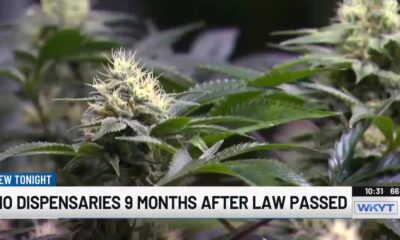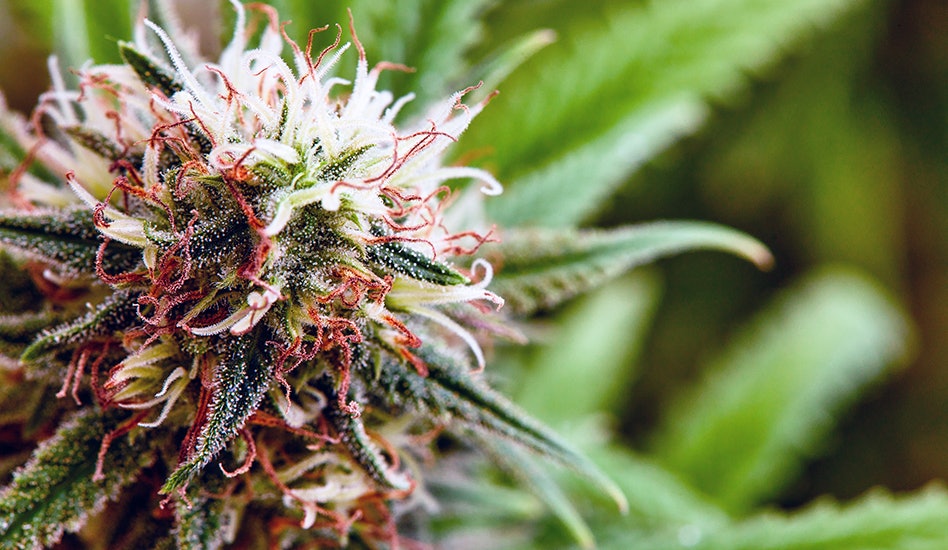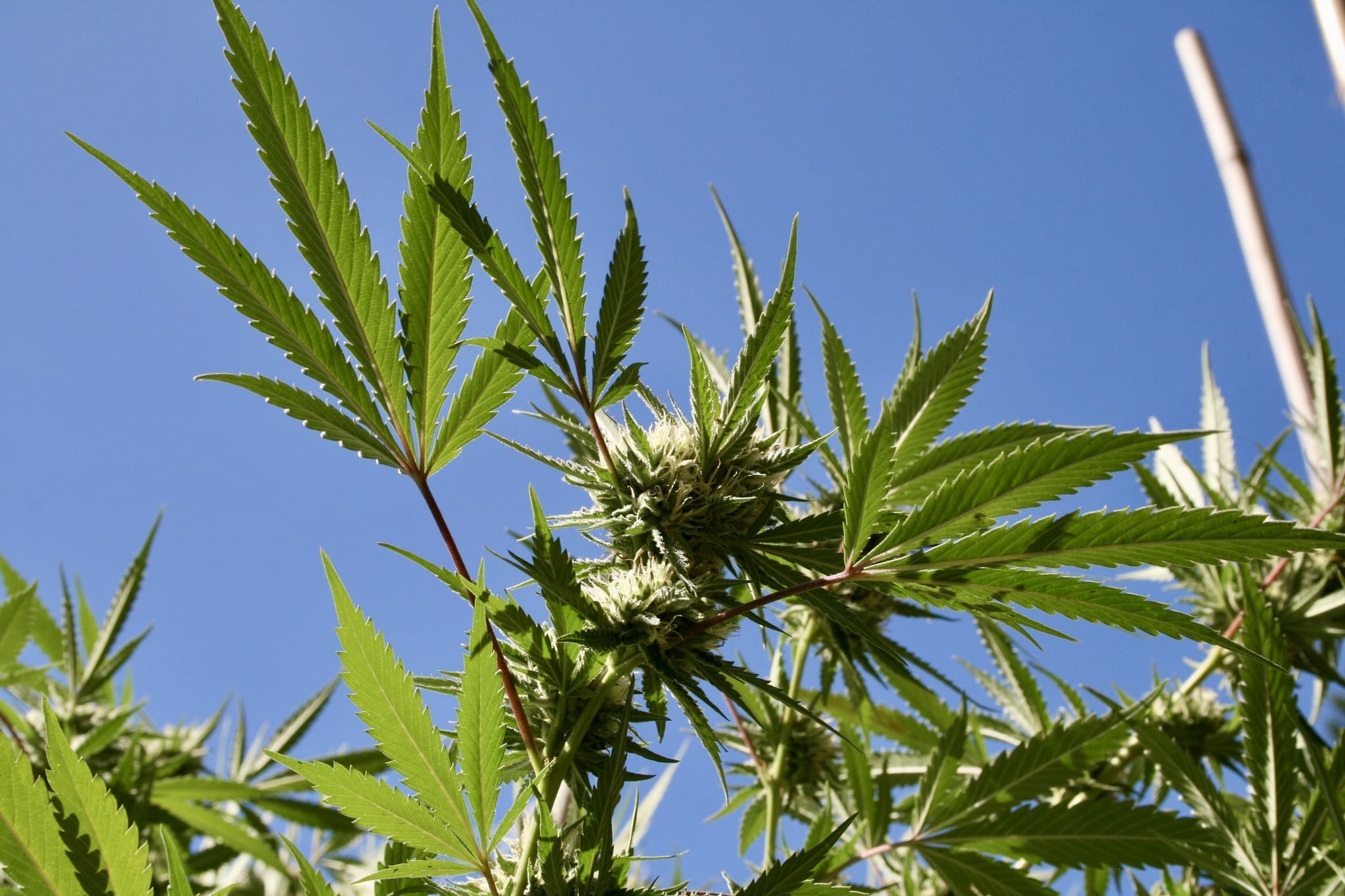featured
Ohio Senate Passes Bill Imposing New Regulations on Intoxicating Hemp Products
Published
4 months agoon

The Ohio Senate last week passed a bill requiring that intoxicating hemp products be sold only at state-licensed adult-use cannabis dispensaries. The legislation passed unanimously.
Currently, intoxicating hemp products are sold at CBD stores, convenience stores, smoke shops, and gas stations. The bill would prohibit sales at any establishment outside of the state’s adult-use dispensaries. It would also impose a 10% tax on intoxicating hemp products, set an age requirement of 21, and impose testing and labeling requirements.
In a statement, state Sen. Steve Huffman (R) said that “Current intoxicated hemp products are untested and unregulated.”
“The bill protects buyers from gaining access to these intoxicating products and ensures adults can still purchase them from existing regulated operators.” — Huffman in a statement
During debate on the Senate floor, state Sen. Bill DeMora (D) said the legislation “regulates intoxicating hemp products and removes the untested, unsafe items that are marketed toward children from corner stores and vape shops and gas stations.”
He described the proposed rules on testing, labeling, and age verification as “common sense measures.”
During debate on the bill in March, Jaimee Courtney, who owns a CBD business in Bellefontaine, said the legislation would eliminate 90% of the “non-intoxicating full-spectrum hemp products” sold at her business and would “drive consumers to unregulated online markets,” according to her written testimony to lawmakers.
The bill moves next to the House.
Get daily cannabis business news updates. Subscribe
Have an additional perspective to share? Send us a message to let us know, and if your comment is chosen by our editors it could be featured here.
Perspective to add? Suggest a revision or submit commentary for review using the form below.
Ganjapreneur is made possible by our partners:

Author: mscannabiz.com
MScannaBIZ for all you Mississippi Cannabis News and Information.
You may like
-


Appellate Court Rules Delta-8, Delta-10 THC Prohibited in Maryland
-


Laws, public perception lagging risk, expert says
-


Federal Marijuana Legalization Bill Deserves Lawmakers’ Support, Letter From ACLU And Other Groups Says
-


Watertown could create new rules for cannabis shops
-


Rhode Island Opens Applications for 24 Adult-Use Dispensary Licenses
-


Kentucky still waiting on medical marijuana dispensaries 9 months after law passed
featured
Appellate Court Rules Delta-8, Delta-10 THC Prohibited in Maryland
Published
1 hour agoon
September 15, 2025
Delta-8 and delta-10 THC are illegal, and state law that prohibits businesses from selling hemp-derived products without a license is constitutional, the Appellate Court of Maryland ruled on Sept. 9.
The ruling reverses a lower court’s decision to grant a preliminary injunction to the Maryland Hemp Coalition and several hemp retailers, producers, farmers and consumers, who had challenged the state’s licensing requirement under the Cannabis Reform Act (CRA) that the Maryland General Assembly passed in 2023 to regulate an adult-use marketplace.
The now-lifted injunction had prevented state officials from enforcing the CRA’s licensing requirement for hemp-related businesses wishing to sell intoxicating products.
Although the state is now allowed to enforce the licensing requirements on hemp businesses, the Maryland Appellate Court ruled that intoxicating products containing synthetic hemp derivatives created in a chemical process remain illegal.
“While this case turns on the state’s ability to enforce the licensing requirement against hemp-derived psychoactive products, the parties have not addressed the legality of these products,” Appellate Judge Daniel A. Friedman wrote. “As we explain below, hemp-derived psychoactive products, so-called delta-8 and delta-10 THC, are now and have always been illegal in Maryland. That the prohibition has been the subject of lax enforcement does not make it legal.”
Furthermore, the judge pointed out that intoxicating products with hemp derivatives took off nationwide after the 2018 Farm Bill federally legalized the commercial cultivation of hemp because U.S. lawmakers did not regulate finished goods in that agricultural legislation.
“This may have contributed to businesses in Maryland and across the country selling these products,” Friedman wrote.
However, the judge explained, the 2018 Farm Bill did not prevent state governments from regulating their hemp marketplaces more stringently than the federal legislation. And, since the Maryland Department of Agriculture submitted Maryland’s state hemp plan to the U.S. Department of Agriculture in 2020, the 2018 Farm Bill does not preempt the state’s regulations on hemp, the court ruled.
The Maryland General Assembly adopted the state’s hemp cultivation program in 2019 and placed restrictions on intoxicating hemp-derived products.
“Based on the regulatory history of hemp and the products derived from it, the legal status of hemp-derived psychoactive products in Maryland prior to the enactment of the Cannabis Reform Act was clear,” Friedman wrote. “While these products may have proliferated during the period of regulatory uncertainty created by the 2018 federal Farm Bill, Maryland law prohibited the use or creation of hemp-derived psychoactive products.
“Significantly, the Cannabis Reform Act bans the sale of most hemp-derived psychoactive products. It does so by prohibiting products ‘not derived from naturally occurring biologically active chemical constituents.’ AB § 36-1102(c). Thus, because hemp-derived psychoactive products, including delta-8 and delta-10 THC, are derived from a chemical process … these products are prohibited.”
The Maryland Hemp Coalition, et al., also argued in the lawsuit that the CRA created an unconstitutional monopoly under Article 41 of the Maryland Declaration of Rights because of a common right exception. Maryland was the first state to adopt a constitutional anti-monopoly provision in 1776, according to the appellate court.
The court considered whether there was a common right to intoxicating hemp-derived products in both the broader cannabis market and the limited hemp market. The court determined there was not a common right in the broader market because of cannabis’s Schedule I federal status under the Controlled Substances Act. The court also determined Maryland’s agricultural hemp laws did not create a common right.
Under the monopoly argument, the court ruled Maryland Hemp Coalition did not attempt to define the relative market—including the size of the market, the products involved, and the size of the monopoly in relation to the market—which Friedman opined was a relevant matter of law.
The court considered several choices for a relevant market:
- All intoxicating products (hemp, marijuana, alcohol, other drugs)
- All products of the cannabis plant (hemp, marijuana, nonintoxicating, intoxicating, intended for human consumption, not intended for consumption)
- Only intoxicating cannabis products (hemp, marijuana)
- Only marijuana products
- Only hemp products
“The determination of the relevant market is neither theoretical nor academic,” Friedman wrote. “It affects whether a litigant can prove their Article 41 claims, it affects the type of analysis a court performs, and it affects whether an alleged monopoly satisfies an exception under Article 41. … In fact, we think the failure to identify the relevant market led to confusion here. That is, the Hemp Coalition’s arguments could apply to at least two markets—the broader cannabis market or the limited hemp-derived psychoactive products market.”
Given the ambiguity, the court ruled the Maryland Hemp Coalition cannot succeed on its monopoly argument that the CRA infringes on a common right.
Furthermore, the court determined that the CRA is permissible under Article 41 because the state’s cannabis regulations are “reasonably required” for the public interests, including consumer safety, youth protections, and social equity initiatives that remedy past discrimination.
“The Maryland General Assembly considered the dangers of both cannabis products generally and hemp-derived psychoactive products specifically and, in response, created a licensing requirement alongside product safety standards under the Cannabis Reform Act,” Friedman wrote. “We hold that the licensing requirement was reasonably required to protect the public health and fits within the public interest exception to Article 41.”
As a result of the court ruling, all Maryland businesses must first obtain a cannabis license before selling any intoxicating cannabinoid products—whether derived from marijuana or hemp.

Author: mscannabiz.com
MScannaBIZ for all you Mississippi Cannabis News and Information.
featured
Federal Marijuana Legalization Bill Deserves Lawmakers’ Support, Letter From ACLU And Other Groups Says
Published
3 hours agoon
September 15, 2025
A coalition of drug policy reform and civil rights organizations sent letter urging members of the U.S. House of Representatives to cosponsor a recently filed bill to federally legalize marijuana and promote equity.
The letter, led by the Drug Policy Alliance (DPA), expresses support for the Marijuana Opportunity, Reinvestment and Expungement (MORE) Act, which was reintroduced by Rep. Jerrold Nadler (D-NY) and about three dozen cosponsors late last month.
This marks the fourth session in a row that Nadler has put forward the proposal. It passed the House twice under Democratic control while the sponsor served as chairman of the Judiciary Committee, but it did not advance last session with Republicans in the majority.
“The MORE Act is the leading comprehensive marijuana reform bill in the House that ends federal prohibition, addresses the collateral consequences of federal marijuana criminalization, and takes steps to ensure the regulated marketplace is diverse and inclusive,” the letter—which was also signed by groups such as the ACLU, National Association of Criminal Defense Lawyers, National Association of Social Workers, Service Employees International Union and Southern Poverty Law Center—says.
“For generations, marijuana’s placement on the [Controlled Substances Act, or CSA] has disproportionately inflicted harm upon communities of color and poor people,” the groups wrote.
They noted that the Trump administration is actively considering a proposal to simply reschedule cannabis, which they described as “a policy that would continue federal cannabis criminalization and its harm.”
With that reform pending, it’s “more important than ever for Congress to advance comprehensive legislation to deschedule marijuana from the CSA,” the letter says. “To be clear, as long as marijuana remains anywhere in the CSA, it will still be criminalized at the federal level.”
“Recent news reports have suggested that President Trump may move marijuana to Schedule III of the CSA. While this move would eliminate an unfair tax penalty on the marijuana industry and would be of symbolic importance by recognizing that marijuana has accepted medical use, little else would change. In fact, rescheduling marijuana from Schedule I to Schedule III of CSA will maintain the criminal penalties and collateral consequences that are in effect today. To fully address the conflict between state and federal laws, marijuana must be descheduled from the CSA.”
Other signatories on the letter include Cannabis Regulators of Color Coalition (CRCC), Doctors for Drug Policy Reform, JustLeadershipUSA, Last Prisoner Project (LPP), Law Enforcement Action Partnership (LEAP), Lawyers’ Committee for Civil Rights Under Law, Minority Cannabis Business Association (MCBA), Mission Green, NORML, Students for Sensible Drug Policy (SSDP), Supernova Women and more.
Here are details about the key provisions of the MORE Act:
- The bill would deschedule marijuana by removing it from the list of federally banned drugs under the CSA. However, it would not require states to legalize cannabis and would maintain a level of regulatory discretion up to states.
- Marijuana products would be subject to a federal excise tax, starting at five percent for the first two years after enactment and rising to eight percent by the fifth year of implementation.
- Nobody could be denied federal public benefits based solely on the use or possession of marijuana or past juvenile conviction for a cannabis offense. Federal agencies couldn’t use “past or present cannabis or marijuana use as criteria for granting, denying, or rescinding a security clearance.”
- Noncitizens could not be penalized under federal immigration laws for certain cannabis activity after the enactment of the legislation.
- The bill creates a process for expungements of non-violent federal marijuana convictions.
- Tax revenue from cannabis sales would be placed in a new “Opportunity Trust Fund.” Half of those tax dollars would support a “Community Reinvestment Grant Program” under the Justice Department, 10 percent would support substance misuse treatment programs, 40 percent would go to the federal Small Business Administration (SBA) to support implementation and a newly created equitable licensing grant program.
- The Community Reinvestment Grant Program would “fund eligible non-profit community organizations to provide a variety of services for individuals adversely impacted by the War on Drugs…to include job training, reentry services, legal aid for civil and criminal cases (including for expungement of cannabis convictions), among others.”
- The program would further support funding for substance misuse treatment for people from communities disproportionately impacted by drug criminalization. Those funds would be available for programs offering services to people with substance misuse disorders for any drug, not just cannabis.
- While the bill wouldn’t force states to adopt legalization, it would create incentives to promote equity. For example, SBA would facilitate a program to providing licensing grants to states and localities that have moved to expunge records for people with prior marijuana convictions or “taken steps to eliminate violations or other penalties for persons still under State or local criminal supervision for a cannabis-related offense or violation for conduct now lawful under State or local law.”
- The bill’s proposed Cannabis Restorative Opportunity Program would provide funds “for loans to assist small business concerns that are owned and controlled by individuals adversely impacted by the War on Drugs in eligible States and localities.”
- The comptroller general, in consultation with the head of the U.S. Department of Health and Human Services (HHS), would be required to carry out a study on the demographics of people who have faced federal marijuana convictions, “including information about the age, race, ethnicity, sex, and gender identity.”
- The departments of treasury, justice and the SBA would need to “issue or amend any rules, standard operating procedures, and other legal or policy guidance necessary to carry out implementation of the MORE Act” within one year of its enactment.
- Marijuana producers and importers would also need to obtain a federal permit. And they would be subject to a $1,000 per year federal tax as well for each premise they operate.
- The bill would impose certain packaging and labeling requirements.
- It also prescribes penalties for unlawful conduct such as illegal, unlicensed production or importation of cannabis products.
- The Treasury secretary would be required to carry out a study “on the characteristics of the cannabis industry, with recommendations to improve the regulation of the industry and related taxes.”
- The Bureau of Labor Statistics (BLS) would be required to “regularly compile, maintain, and make public data on the demographics” of marijuana business owners and workers.
- Workers in “safety sensitive” positions, such as those regulated by the Department of Transportation, could continue to be drug tested for THC and face penalties for unauthorized use. Federal workers would also continue to be subject to existing drug testing policies.
- References to “marijuana” or “marihuana” under federal statute would be changed to “cannabis.” It’s unclear if that would also apply to the title of the bill itself.
Getting a bill like the MORE Act through the GOP-controlled House and Senate is a tall task, however. And while Trump previously endorsed a Florida legalization ballot initiative, he’s given little indication he’d be willing to end prohibition altogether at the federal level.
A pending proposal to simply move cannabis from Schedule I to Schedule III under the CSA is still in flux—though the president did recently say a decision was imminent.
—
Marijuana Moment is tracking hundreds of cannabis, psychedelics and drug policy bills in state legislatures and Congress this year. Patreon supporters pledging at least $25/month get access to our interactive maps, charts and hearing calendar so they don’t miss any developments.![]()
Learn more about our marijuana bill tracker and become a supporter on Patreon to get access.
—
Numerous voices within Trump’s circles have expressed differing opinions on the reform.
Most recently, for example, Ben Carson, Trump’s former secretary of the Department of Housing and Urban Development (HUD), said a move to reschedule marijuana would play into plots to “destroy this country.”
Trump’s former press secretary Sean Spicer and his long-time advisor Roger Stone recently traded diverging takes on the prospect of the administration moving forward on marijuana rescheduling.
Stone separately made the case for reform in an op-ed for Marijuana Moment last month.
Retired boxer Mike Tyson, meanwhile, recently spoke about the need for federal marijuana rescheduling on a podcast hosted by the wife of White House Deputy Chief of Staff for Policy Stephen Miller—saying he’s expecting “good news” on the issue soon.
In June, the retired boxer also took to Fox News and delivered a message to the president, urging him to reschedule, and ultimately legalize, marijuana.
That interview came days after Tyson led a letter alongside other professional athletes and celebrities promoting cannabis reform that was sent to Trump, calling for rescheduling marijuana, expanding clemency and allowing licensed cannabis businesses to access the banking system.
Meanwhile, Trump’s former senior advisor Kellyanne Conway has been the “biggest champion” of marijuana rescheduling within the president’s “inner circle,” a GOP congressman recently told Marijuana Moment.
Photo courtesy of Brian Shamblen.

Author: mscannabiz.com
MScannaBIZ for all you Mississippi Cannabis News and Information.
featured
Rhode Island Opens Applications for 24 Adult-Use Dispensary Licenses
Published
4 hours agoon
September 15, 2025
[PRESS RELEASE] – WARWICK, R.I., Sept. 12, 2025 – The Cannabis Control Commission (CCC) opened the application period for adult-use cannabis retail licenses, marking the beginning of the largest expansion to Rhode Island’s cannabis industry. The commission is authorized under the Rhode Island Cannabis Act to license up to 24 retail establishments statewide, divided equally across six geographic zones, making this announcement a defining moment in shaping the state’s cannabis marketplace.
“Today’s announcement represents years of work, collaboration and preparation to ensure Rhode Island has a cannabis marketplace that is safe, transparent, and equitable,” CCC Chairperson Kim Ahern said. “The release of this application and launch of our submission portal is not only about opening doors for businesses but about creating meaningful opportunities for Rhode Islanders while keeping public health and public safety at the center of everything we do.”
With only 24 retail licenses available statewide, the launch of the application process is expected to draw significant interest from prospective applicants. Together with the Social Equity Applicant Status Certification Portal, which opened in August, the application process reflects the CCC’s deliberate steps toward building a cannabis industry that prioritizes economic opportunity, equity and fairness in Rhode Island.
“Rhode Island’s cannabis market is poised for growth, and this application is helping us do exactly that,” Gov. Dan McKee said. “As we expand the cannabis industry here in the Ocean State, we’re opening the doors to new investment, new good-paying jobs, and new opportunities for our economy.”
Adult-use retail licenses will authorize sales of cannabis products to adults 21 and older. By releasing the application and opening the submission portal simultaneously, the commission is providing applicants with a transparent process while reinforcing its commitment to accountability and access.
“Today’s release of the adult-use retail license application reflects the commission’s commitment to equity and accountability,” Commissioner Layi Oduyingbo said. “This framework provides applicants with the information they need while reinforcing our responsibility to safeguard public health and consumer safety.”
Commissioner Robert Jacquard said, “The commission aims to make this application process as business-friendly as possible, while upholding standards that will protect public health.”
To ensure the process is fair and accessible, the commission and Cannabis Office will provide technical assistance resources and ongoing guidance for prospective applicants. Applications will be accepted until 4 p.m. on Dec. 29, 2025.
“This is a milestone that reflects the dedication and perseverance of so many people,” Cannabis Office Administrator Michelle Reddish said. “From lawmakers and advocates to community members and our dedicated staff, countless individuals have helped build the foundation for this moment. By publishing the application today, we are taking a historic step toward building a cannabis marketplace that serves consumers, supports equity and advances public health in Rhode Island.”
The adult-use retail license application is available on the commission’s website at www.ccc.ri.gov/auapp.

Author: mscannabiz.com
MScannaBIZ for all you Mississippi Cannabis News and Information.

Appellate Court Rules Delta-8, Delta-10 THC Prohibited in Maryland

Laws, public perception lagging risk, expert says

Federal Marijuana Legalization Bill Deserves Lawmakers’ Support, Letter From ACLU And Other Groups Says

Watertown could create new rules for cannabis shops

Rhode Island Opens Applications for 24 Adult-Use Dispensary Licenses

Kentucky still waiting on medical marijuana dispensaries 9 months after law passed

Can LSD Battle Anxiety? The Answer Is Yes, According to Science

Six hurt in shooting at marijuana event in SF's Bayview

Kentucky Medical Marijuana Dispensaries Should Be Stocked With Products Ready For Sale By Next Month, Top State Official Says

Deputies: 3,500 child sex abuse images, marijuana grow operation found in NC home raid

Regulators Ready to Enforce Cannabis Laws on Hemp THC Retailers in Maryland

California reaps over $250 million from 2nd Quarter cannabis sales

Meet the World’s First Cannabis Rugby Team: Crewmen 7’s Tackle Stigma Head-On

Texas Supreme Court Refuses To Take Up Marijuana Case Challenging State’s Rejection Of Local Decriminalization Law

California Passes Bill to Ban Intoxicating Hemp Products Outside Cannabis Market

Pending Federal Hemp Legislation Could Reshape The Legal Industry By Banning Some Products (Op-Ed)

Verano Proposes to Redomicile Parent Company From British Columbia to Nevada

8,000 cannabis plants seized from illegal Bradford grow-op

New York Lawmakers Schedule Psychedelics-Focused Hearing To Discuss ‘Medicinal Value And Risks’ Of Psilocybin

Curaleaf Opens Cannabis Dispensaries in Florida, Ohio

How to Protect Your Outdoor Cannabis Crops From Pests

Feds provide anti-cannabis group a platform to bash legalization (Newsletter: September 15, 2025)

Dozen arrested after south Mississippi bust for illegal sales to underage customers

The Toking Traveler: Why Amsterdam Weed Is Mostly Boof

Alert: Department of Cannabis Control updates data dashboards with full data for 2023

Connecticut Appoints The US’s First Cannabis Ombudsperson – Yes there is a pun in there and I’m Sure Erin Kirk Is Going To Hear It More Than Once!

5 best CBD creams of 2024 by Leafly

EU initiative begins bid to open access to psychedelic therapies
New Study Analyzes the Effects of THCV, CBD on Weight Loss

Free delta-9 gummies from Bay Smokes

Discover New York’s dankest cannabis brands [September 2024]

5 best autoflower seed banks of 2024 by Leafly

Press Release: CANNRA Calls for Farm Bill to Clarify Existing State Authority to Regulate Hemp Products

Curaleaf Start Process Of Getting Their Claws Into The UK’s National Health System – With Former MP (Resigned Today 30/5/24) As The Front Man

May 2024 Leafly HighLight: Pink Runtz strain

Local medical cannabis dispensary reacts to MSDH pulling Rapid Analytics License – WLBT

Recreational cannabis on ballot for third time in South Dakota

5 best THC drinks of 2024 by Leafly

Horn Lake denies cannabis dispensary request to allow sale of drug paraphernalia and Sunday sales | News

Mississippi city official pleads guilty to selling fake CBD products

6 best CBD gummies of 2024 by Leafly

Nevada CCB to Accept Applications for Cannabis Establishments in White Pine County – “Only one cultivation and one production license will be awarded in White Pine County”

The Daily Hit: October 2, 2024

5 best delta-9 THC gummies of 2024 by Leafly

Weekly Update: Monday, May 13, 2024 including, New Guide for Renewals & May Board meeting application deadline

PRESS RELEASE : Justice Department Submits Proposed Regulation to Reschedule Marijuana

5 best THCA flower of 2024 by Leafly

People In This State Googled ‘Medical Marijuana’ The Most, Study Shows
Trending
-

 California Cannabis Updates1 year ago
California Cannabis Updates1 year agoAlert: Department of Cannabis Control updates data dashboards with full data for 2023
-

 Breaking News1 year ago
Breaking News1 year agoConnecticut Appoints The US’s First Cannabis Ombudsperson – Yes there is a pun in there and I’m Sure Erin Kirk Is Going To Hear It More Than Once!
-

 best list1 year ago
best list1 year ago5 best CBD creams of 2024 by Leafly
-

 Business12 months ago
Business12 months agoEU initiative begins bid to open access to psychedelic therapies
-

 cbd1 year ago
cbd1 year agoNew Study Analyzes the Effects of THCV, CBD on Weight Loss
-

 Bay Smokes1 year ago
Bay Smokes1 year agoFree delta-9 gummies from Bay Smokes
-

 cannabis brands12 months ago
cannabis brands12 months agoDiscover New York’s dankest cannabis brands [September 2024]
-

 autoflower seeds12 months ago
autoflower seeds12 months ago5 best autoflower seed banks of 2024 by Leafly




